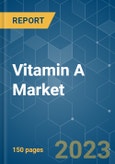The consumption of vitamin A-containing functional foods is increasing across the world. The number of people with micronutrient deficiency is increasing due to the consumption of unhealthy foods. Vitamin A deficiency leads to ophthalmic disorders such as night blindness and corneal ulcers. For instance, according to World Health Organization, globally, at least 2.2 billion people had near or distance vision impairment last year. The awareness of adverse health effects due to the consumption of fast foods has resulted in the increased demand for nutritionally enhanced processed foods. The demand for dietary supplements is increasing on account of an increasing number of people suffering from micronutrient deficiency. Vitamin A is extensively used in the cosmetic industry owing to its positive effects on skin and hair. The demand for naturally sourced vitamin A has increased on account of the growing demand for natural products.
Vitamin A has a strong application in the animal feed industry. The growing demand for meat and dairy products across the world is driving the development of nutritionally rich animal feed. On the other hand, the demand for food fortification increased due to the high rate of micronutrient deficiency disorders among the global population and the lack of micronutrients in food, which may lead to malnutrition. The increase in applications of vitamins in the supplement industry is one of the major factors driving the growth of this market.
Vitamin A Market Trends
Increase in Demand for Fortified Foods and Beverages
There has been a marked shift in the lifestyle and dietary habits of people over the past decade. Urbanization and consumer awareness drove this shift and led to a rapid rise in the consumption of artificial food products, which in turn, increased the incidence of lifestyle diseases. The market is driven by the rise in demand for functional and nutritionally enriched processed food products and the growing incidence of vitamin deficiencies. Also, an increase in the geriatric population, healthcare expenditure, incidences of ophthalmic diseases, and healthcare awareness fuel market growth. Functional foods offer specific health benefits that are beyond the regular daily intake of nutrients, such as improved bone health, cholesterol management, improved heart health, and other benefits associated with eye health and vision. The increasing demand for nutritional and fortifying food additives is anticipated to drive market growth. Food manufacturers are deploying the fortification of nutritional additives, such as omega-3 fatty acids, fiber, and vitamins, including vitamin A and minerals, in their product offerings. The intention of incorporating the additives mentioned above in the food industry is to increase the nutritional content of food items. Various government initiatives are being introduced to increase the consumption of fortified foods and beverages, especially in developing countries like China, South Korea, and India, which is expected to propel the market growth.Asia-Pacific Remains the Fastest-growing Region
Asia-Pacific has been witnessing healthy growth in recent years. Factors, such as improved living standards and in-depth consumer education about the consumption of health supplements infused with micronutrients, like vitamins, minerals, etc., are driving the market. The vitamin A market is growing tremendously across the region due to the growing prevalence of vitamin A deficiency diseases such as rhodopsin, a photoreceptor pigment. The three types of vitamin A include pre-formed vitamin A, provitamin A, and combined vitamin A. The wide range of applications is accomplishing the demand of consumers. The advancement in research and development (R&D) leads to an increased product launch by key market players in the vitamin A market. The rise in economic standards supported by rapid urbanization has led to a shift in consumer focus toward a healthy diet, which is another factor that may drive the market. Major factors driving the growth of the vitamin A market are an increase in government initiation to control the expansion of vitamin A deficiency disease, growing concern for healthier life among others, and the factor which hampers the growth of the vitamin A market are side effects related to the interaction of vitamin supplements with drugs and vitamin A toxicity among others. The partnerships and acquisitions by major market players act as opportunities for the growth of the vitamin A market.Vitamin A Industry Overview
The vitamin A market is consolidated, with the dominance of a few players, such as Koninklijke DSM NV, BASF SE, Fenchem, Archer Daniels Midland Company, and Zhejiang NHU Co. Ltd, holding a majority of the market share. Companies are also increasing their focus on expansion and partnering with other global vitamin-producing companies to ease their production and incorporate cost-efficient production techniques to strengthen the market position. Brand loyalty is a high-impact factor, with the quality of ingredients being a prime parameter. Companies need to have a strong focus on quality, and this attribute plays a pivotal role in brand positioning in this B2B market. Moreover, the companies are spending highly on R&D, with a plan to provide their buyers with a differentiated product offering.Additional Benefits:
- The market estimate (ME) sheet in Excel format
- 3 months of analyst support
This product will be delivered within 2 business days.
Table of Contents
Companies Mentioned (Partial List)
A selection of companies mentioned in this report includes, but is not limited to:
- Koninklijke DSM NV
- BASF SE
- Fenchem
- Archer Daniels Midland Company
- Zhejiang NHU Co. Ltd
- Divi’s Laboratories Limited
- Foodchem International Corporation
- Zhejiang Medicine Co. Ltd.
- Adisseo
- Nutrilo GmbH










